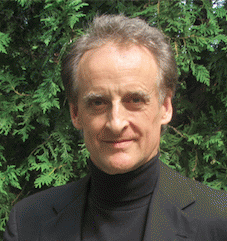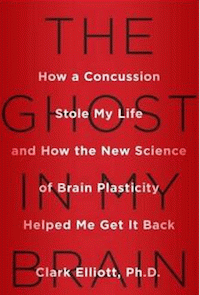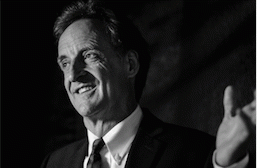| Back OpEd News | |||||||
|
Original Content at https://www.opednews.com/articles/Professor-Recovers-From-De-by-Joan-Brunwasser-Author_Chicago_Doctors_Interviews-150704-164.html (Note: You can view every article as one long page if you sign up as an Advocate Member, or higher). |
|||||||
July 5, 2015
Prof. Recovers From Debilitating Concussion 10 Years Later [Part 1]
By Joan Brunwasser
I was consistently told that my brain damage was permanent, that I would never recover, and that no one with my kind of damage ever got better, to learn to live with my symptoms.In a last-gasp effort to hold on to my life before losing my job, my house, custodianship of my children and becoming a ward of the state, I got lucky: I chanced upon Donalee Markus and Deborah Zelinsky.
::::::::
Interview with Clark Elliott, author of The Ghost in My Brain: How a Concussion Stole My Life and How the New Science of Brain Plasticity Helped Me Get It Back
My guest today is Clark Elliott, professor at DePaul University and author of The Ghost in My Brain: How a Concussion Stole My Life and How the New Science of Brain Plasticity Helped Me Get it Back [Viking Press, June, 2015].
JB: Welcome to OpEdNews, Clark. Please tell us why you wrote this book.
CE: Thank you, Joan. I was consistently told for almost a decade that my brain damage was permanent, that I would never recover, and that no one with my kind of damage ever got better. I was advised to learn to live with my symptoms. Then, in a last-gasp effort to hold on to my life before losing my job, my house, custodianship of my children and becoming a ward of the state, I got lucky: I chanced upon Donalee Markus and Deborah Zelinsky. Deborah told me, "I know what is wrong with you--and I know how to fix it." And she was right.
I had been given this great gift, I was one of the very few that ever got better. I was so very ready to close the door on that experience and move on. After all, I had already lost ten years of my life by the time I was fully recovered. But I thought, I've taken 1,200 pages of notes. I can articulate exactly what the experience of a serious concussion is like, and I also know why I got better--the science behind the brain plasticity miracle that restored my brain to health. How many others were stuck in the same waking nightmare?
So I wrote the book for these two reasons. First, to articulate, with clarity, what it is that concussives and their families may be going through: why they burn food in the kitchen, or have so much reluctance to make plans. Why one minute they seem fully functional, and the next minute they are unable to understand even the simplest directions. Second, to make clear at a reader's level the neurocognitive science behind my recovery, because I believe these techniques, based on the plastic nature of our brains, will be potentially useful for so many others.
Lastly, the book was also simply a celebration of the marvelous design of the human brain. The more we look the hundreds of small ways it can break down with concussion, the more we must be in awe of the staggering complexity and power of this mysterious organ.
JB: If I recall correctly from your book, initially, your concussion was not diagnosed. And once it was, no one offered you any hope, despite the horrific symptoms you suffered. Before we talk about what your daily life was like, why do you think your condition flew under the radar and then was basically left untreated? You went to reputable medical facilities after all, no?
CE: To their credit, the EMTs at the scene of the original crash were clear in their assessment that I had a concussion that should be checked out. Unfortunately, I couldn't make sense of what they were saying. I just couldn't get it--after all I seemed to look O.K., how could there be something wrong? So, I ignored their suggestion and went on to teach my evening class. But even at the time of the crash, weird things were already happening. For example, the police officer wanted my insurance card. I took a pile of six pieces of paper out of my glove box but I couldn't figure out how to select the insurance card from it and hand it to him. In the end, he got tired of waiting and took my license instead. And, of course, this strange inability to recognize that something has gone missing is one of the most insidious aspects of concussion: those parts of our psyches are just gone--so much so that we don't have even the machinery left to realize their absence.
I finally went to the emergency room three days later, after coming to understand that it was not normal for me to take six hours to figure out that I had my shoes on the wrong feet. I spent seven hours in the hospital, and the diagnosis was clear: severe concussion. Every subsequent visit to an M.D. or rehab center confirmed the same, based on what little evidence they could gather: that I had suffered a concussion.
But that is where it ended. Everyone was also clear about the next part as well: there is mostly no treatment other than what the body can do on its own over the course of the first two years. The damaged parts of my brain were gone for good. Sometimes, medicines like Prozac can help jump start the brain. Sometimes, balance therapy might help. But, mostly, no one ever gets better and I should develop strategies for living with my symptoms.
It wasn't until I saw Markus and Zelinsky all those years later that I was given the tests that were actually appropriate, and revealed what was wrong.
JB: Before you met Markus and Zelinsky, how did you function with these disabling symptoms, Clark? Can you paint a picture of what your daily life was like so our readers will have a better sense of what you were dealing with?
CE: Well, the short answer is, it was not easy. Life with brain damage is pretty much a challenge from the moment of waking until the moment of finally falling asleep at night. Then too, my sleep was changed, including the way I dreamed.
Like many concussives, I got through my days by being very crafty about taking on only what I could manage, conserving my scarce brain resources, and being intensely creative in the ways I solved the continual problems that arose.
The spatial reasoning that supported my executive functioning was compromised so that plans of any sort of complexity were beyond me. It took a month of intense painful daily sessions for example--I really pushed myself--to come up with a simple paper calendar that I could use in a rudimentary way. Concepts like "next Thursday at 5:00 PM" were often beyond my understanding.
At times when my visual system was fatigued, I was unable to create clear goals for my body to follow, and I'd lose the ability to walk, to get up out of a chair, or move my hands. I several times almost froze to death when trying to walk to my car during the wintertime: my body just stopped moving altogether.
JB: Yikes! Scary.
CE: Shopping was sometimes overwhelming because of the visual chaos in the store aisles.
I often could not follow what people were saying--I couldn't process the words fast enough to keep up. In general under brain stress, when I just forced myself to keep processing information, such as when I needed to get grading done for a class, I would deteriorate into increasingly slow motion. My eyes and hands would move at maybe one twentieth of normal speed.
Some tasks were particularly hard. For example the grading of exams was extremely difficult because it required intense pattern-matching (comparing answers to the answer key), critical reading, spatial rotations (of the exam papers themselves) and the making of complex decisions about how to grade each answer--each of which was independently difficult. It might take me ten minutes to grade each of the first three exams, but up to two hours of brutally intense work for each of the last few exams. It would take me several weeks to recover from the grading of just one set of exams. I hated grading! Ouch!
There were several saving grace points without which I would have been much worse off, so I was lucky in this way. First, I was fanatically careful about not driving when I was impaired. But as long as I was OK when starting out, the smooth motion along the periphery of my visual field was soothing and actually improved my brain state, if anything. So I could drive. Second, I had a sort of emergency mode that I could call on if I really needed to. This was only good for a short time, and the cognitive toll was very high, but it meant that I had a safety buffer. This allowed me a great many activities that otherwise would not have been possible: I could go to meetings at work, and could take my kids traveling with me. Third, my disposition is just naturally upbeat, and I am used to solving problems as a way of life--both professionally and personally, so despite the challenges, I was OK with being in problem-solving mode all day long.
JB: I can't even imagine living like that and "knowing" that there was no way to get your old life back. You say you have a naturally upbeat personality. That's fortunate, indeed, but it's quite easy to understand how formerly high-functioning people with this constellation of symptoms could not only give up but even take their own lives out of sheer frustration and depression. Did that thought ever cross your mind?
CE: Thank you for asking about this troublesome topic. In the last four days, I heard from parents about three more suicides as a result of concussion, which is disturbing. In my own case, I was fortunate that I never once thought of it. It is my understanding that many concussives have emotional difficulties, and also suffer from depression over their circumstances. I never had that burden. I felt periods of intense stress as I tried to keep up with my life, but that is a very different problem.
The best short answer, in my case, was that I was just too busy getting through every hour, and sometimes every minute of each day to consider such options. And, importantly, I had five children, and others, so completely dependent on me being a breadwinner, a father, husband, son, and son-in-law that it would have been out of the question anyway. Once I started playing tai chi regularly, I could always transform even a horrible day into a really good and interesting horrible day--so I had a secret weapon. I just learned to watch the chi move, whatever it might be.
As I've pondered in the book, I have to wonder about the following: Concussion damage can be so extremely alienating. I felt non-human, and I know that many others also felt this way. It is maybe not such a big step to move from there--wherein the self is already just gone--to actual physical death of the broken down body that can no longer support being human anyway. Perhaps for many, it just doesn't seem to matter much. My heart goes out to them and their families.
JB: My heart goes out to them, too. Let's pause here, Clark. When we come back for the final half of our interview, we'll discuss how you recovered your health, despite all the medical naysaying. Readers, don't miss it!
***
Part two of this interview
Clark's website
brief bio: Clark Elliott, PhD, has been a professor of Artificial Intelligence at DePaul University for twenty-seven years. He holds three teaching certificates for music, the B.M., M.M. (music), and M.S. (computer science) degrees, and a Ph.D. from Northwestern University's Institute for the Learning Sciences with an emphasis on computer simulations of human emotion. He lives with his wife and daughter in Evanston, Illinois. He has raised four other children, studies Tai Chi and music every day, and continues as a casual marathon runner.
The Ghost in My Brain: How a Concussion Stole My Life and How the New Science of Brain Plasticity Helped Me Get it Back [Viking, June, 2015]
Video of 12-minute talk Clark gave: Cognitive Rehabilitation after TBI via Retinal Stimulation: A 12-year self-reporting case study
Dr. Deborah Zelinsky, the Mind-Eye Connection website
Dr. Donalee Markus, Designs for Strong Minds: Learning How to Learn website
The Women Who Face More Traumatic Brain Injury Than NFL Players Huffington Post 6/2/2015
Thanks to Margo Rush for pointing me to this story
Authors Website: http://www.opednews.com/author/author79.html
Authors Bio:
Joan Brunwasser is a co-founder of Citizens for Election Reform (CER) which since 2005 existed for the sole purpose of raising the public awareness of the critical need for election reform. Our goal: to restore fair, accurate, transparent, secure elections where votes are cast in private and counted in public. Because the problems with electronic (computerized) voting systems include a lack of transparency and the ability to accurately check and authenticate the vote cast, these systems can alter election results and therefore are simply antithetical to democratic principles and functioning.
Since the pivotal 2004 Presidential election, Joan has come to see the connection between a broken election system, a dysfunctional, corporate media and a total lack of campaign finance reform. This has led her to enlarge the parameters of her writing to include interviews with whistle-blowers and articulate others who give a view quite different from that presented by the mainstream media. She also turns the spotlight on activists and ordinary folks who are striving to make a difference, to clean up and improve their corner of the world. By focusing on these intrepid individuals, she gives hope and inspiration to those who might otherwise be turned off and alienated. She also interviews people in the arts in all their variations - authors, journalists, filmmakers, actors, playwrights, and artists. Why? The bottom line: without art and inspiration, we lose one of the best parts of ourselves. And we're all in this together. If Joan can keep even one of her fellow citizens going another day, she considers her job well done.
When Joan hit one million page views, OEN Managing Editor, Meryl Ann Butler interviewed her, turning interviewer briefly into interviewee. Read the interview here.
While the news is often quite depressing, Joan nevertheless strives to maintain her mantra: "Grab life now in an exuberant embrace!"
Joan has been Election Integrity Editor for OpEdNews since December, 2005. Her articles also appear at Huffington Post, RepublicMedia.TV and Scoop.co.nz.


